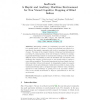Free Online Productivity Tools
i2Speak
i2Symbol
i2OCR
iTex2Img
iWeb2Print
iWeb2Shot
i2Type
iPdf2Split
iPdf2Merge
i2Bopomofo
i2Arabic
i2Style
i2Image
i2PDF
iLatex2Rtf
Sci2ools
COSIT
2009
Springer
2009
Springer
SeaTouch: A Haptic and Auditory Maritime Environment for Non Visual Cognitive Mapping of Blind Sailors
Abstract. Navigating consists of coordinating egocentric and allocentric spatial frames of reference. Virtual environments have afforded researchers in the spatial community with tools to investigate the learning of space. The issue of the transfer between virtual and real situations is not trivial. A central question is the role of frames of reference in mediating spatial knowledge transfer to external surroundings, as is the effect of different sensory modalities accessed in simulated and real worlds. This challenges the capacity of blind people to use virtual reality to explore a scene without graphics. The present experiment involves a haptic and auditory maritime virtual environment. In triangulation tasks, we measure systematic errors and preliminary results show an ability to learn configurational knowledge and to navigate through it without vision. Subjects appeared to take advantage of getting lost in an egocentric “haptic” view in the virtual environment to improve pe...
| Added | 26 May 2010 |
| Updated | 26 May 2010 |
| Type | Conference |
| Year | 2009 |
| Where | COSIT |
| Authors | Mathieu Simonnet, Dan Jacobson, Stephane Vieilledent, Jacques Tisseau |
Comments (0)

